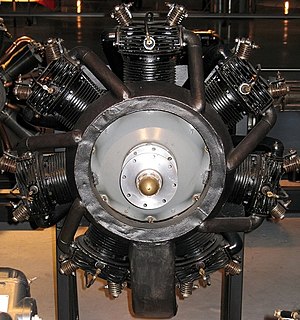Warner Scarab
| Scarab | |
|---|---|

| |
| Preserved Warner Scarab | |
| Type | Radial engine |
| Manufacturer | Warner Aircraft Corporation |
| First run | November 1927 |
The Warner Scarab is an American seven-cylinder radial aircraft engine, that was manufactured by the Warner Aircraft Corporation of Detroit, Michigan in 1928 through to the early 1940s. In military service the engine was designated R-420.
Variants
- Scarab S-50
- A 7-cyl. air-cooled radial engine introduced in 1928. With a bore and stroke of 4.25 inches and a compression ratio of 5.2:1, the Scarab developed 125 hp (93 kW) at 2,050 rpm from 422 cu in (7 L) with a dry weight of 285 lb (129 kg).
- Scarab Junior
- A 5-cyl. version introduced in 1930 developing 90 hp (67 kW) at 2,125 rpm from 301 cu in (5 L) with a dry weight of 230 lb (104 kg).

- Super Scarab SS-50/50A
- Increased cylinder bore to 4.625 inches to develop 145 hp (108 kW) at 2,050 rpm from 499 cu in (8 L) with a dry weight of 303 lb (137 kg).[1]
- Super Scarab SS-165
- Increased compression ratio from 5.2:1 to 6.4:1 to develop 165 hp (123 kW) at 2,100 rpm with a dry weight of 341 lb (155 kg).
- Super Scarab SS-185
- Increased cylinder bore to 4.875 inches, developing 185 hp (138 kW) at 2175 rpm from 555 cu in (9 L), with a dry weight of 344 lb (156 kg).
- R-420
- Military designation of the Scarab.
- R-500
- Military designation of the Super Scarab 165.
- R-550
- Military designation of the Super Scarab 185.
- 145
- Alternative designation for the Warner Super Scarab SS-50/50A .
- 165
- Alternative designation for the Warner Super Scarab 165 .
- 185
- Alternative designation for the Warner Super Scarab 185 (Primarily a helicopter application).
Applications
Among the many uses for the Scarab, the engine was fitted to the Cessna Airmaster and the Fairchild 24 (UC-61 or Argus). Notably, in 1942, it was put into use powering the Sikorsky R-4, the first helicopter to be put into production.
Many of these reliable engines soldier on today, still powering the aircraft to which they were originally mounted. The Warner 145 and 165 hp engines are the most commonly seen of the small radials for US-built pre-World War II era aircraft, in large part because of good parts availability due to the engines having been used on World War II Fairchild UC-61s and Meyers OTWs.
Warner engines are also in demand as realistically sized, though far more powerful, replacement powerplants for many replica or restored World War I era airplanes which were originally fitted with rotary engines.
Application list
- CAC Wackett
- Cessna Airmaster
- Cessna Model AW
- Curtiss XC-10
- Davis D-1
- Fairchild 22 C7E, C7F
- Fairchild 24 C8B
- Fleet Model 1
- FMA Ae.C.3
- General Aristocrat
- Gee Bee Sportster Model E
- Harlow PJC-2
- L-class blimp
- Meyers OTW
- Monocoupe 110
- Pasped Skylark
- Redfern Nieuport 17/24
- Ryan S-C
- Ryan ST-W
- Sands Fokker Dr.1 Triplane
- Sikorsky R-4
- Stinson SM-2
- Waco RSO
- Waco RBA
- Waco BNF and RNF
Specifications (Scarab 50)

Data from FAA Type Certificate Data Sheet (TCDS).,[2] Jane's all the World's Aircraft 1938[3]
General characteristics
- Type: Seven-cylinder, air-cooled, radial piston engine
- Bore: 4.25 in (108 mm)
- Stroke: 4.25 in (108 mm)
- Displacement: 422 cu in (6.92 L)
- Length: 29 in (740 mm)
- Diameter: 36.5625 in (928.69 mm)
- Height: 36.5 in (930 mm)
- Dry weight: 292 lb (132 kg)
Components
- Valvetrain: 1 inlet and 1 exhaust valve per cylinder
- Fuel system: Stromberg NA-5SA carburetor or Holley equivalent
- Fuel type: 67 octane Avgas
- Oil system: Dry sump
- Cooling system: Air-cooled
Performance
- Power output: 125 hp (93 kW) at 2,050 rpm
- Compression ratio: 5.15:1
- Specific fuel consumption: 0.55 lb/(hp hr) [0.334 kg/(kW hr)]
- Oil consumption: 0.025 lb/(hp hr) [0.015 kg/(kW hr)]
- Power-to-weight ratio: 0.43 hp/lb
See also

Related development
Comparable engines
Related lists
References
- ^ Warner Engine Company. "Engine Specifications" (PDF). warnerenginecompany.com. Archived (PDF) from the original on 2022-05-20.
- ^ TYPE CERTIFICATE DATA SHEET NO. E-2 (PDF). DEPARTMENT OF TRANSPORTATION FEDERAL AVIATION ADMINISTRATION. Archived from the original (PDF) on 2022-05-12.
- ^ Grey, C.G.; Bridgman, Leonard, eds. (1938). Jane's all the World's Aircraft 1938. London: Sampson Low, Marston & company, ltd. p. 103d.
External links
- Oldengine.org - US Aero Engine data page Archived 2016-03-03 at the Wayback Machine
- Transcribed manual
